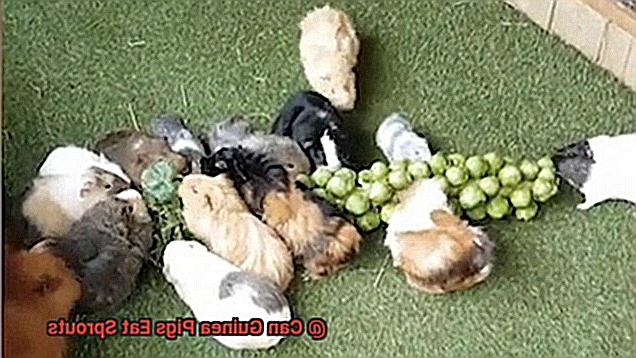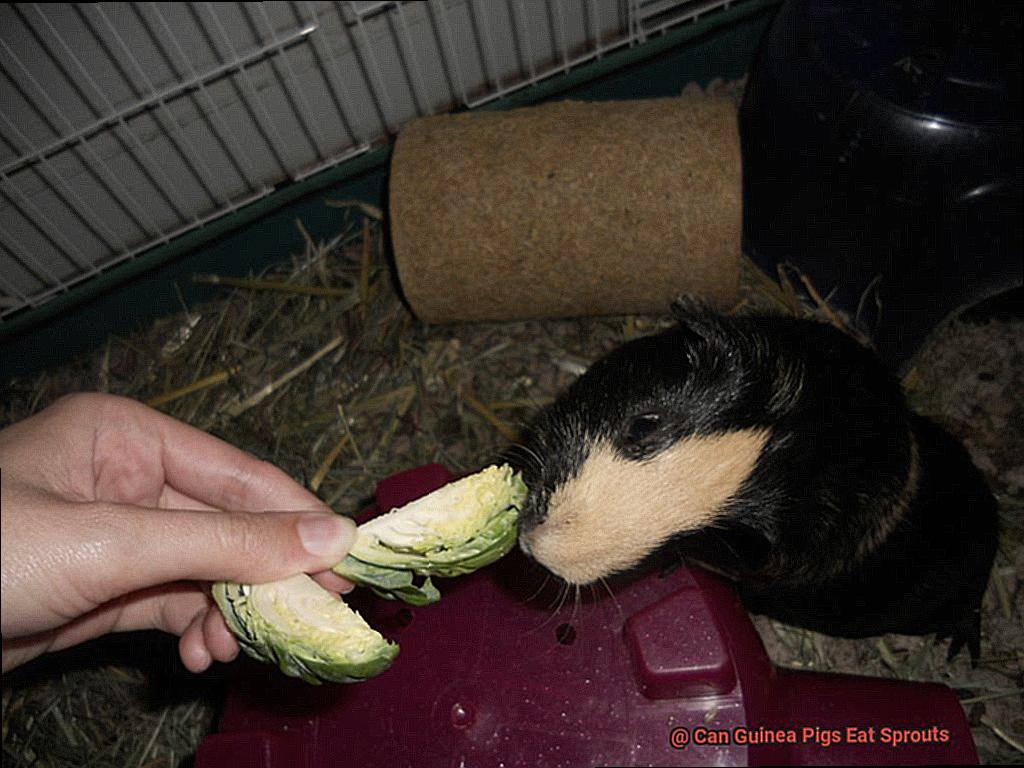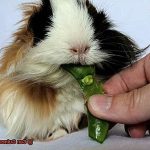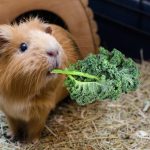Guinea pigs are the perfect pets for those who love cuddly and adorable little creatures.
As herbivores, they only eat fruits and vegetables, which means pet owners are always searching for new ways to bring variety to their furry friend’s diet. That’s why the question “Can guinea pigs eat sprouts?”

is on every health-conscious pet owner’s mind. Sprouts are a staple in salads, sandwiches, and other dishes, making you wonder if they’re safe and healthy for your guinea pig.
The good news is that guinea pigs can eat sprouts. In fact, they can even benefit from them in several ways.
Sprouts are jam-packed with vitamins and minerals that guinea pigs need to stay healthy. They’re an excellent source of vitamin C, which is crucial for guinea pigs since they can’t produce this vitamin on their own.
Additionally, sprouts are low in calories, making them an excellent choice for obese guinea pigs. However, it’s important to remember that moderation is key when feeding your guinea pig sprouts.
Too many sprouts can lead to indigestion and other health problems. So it’s essential to give your furry friend sprouts in moderation along with other fresh fruits and veggies.
So, keep reading.
What are Sprouts?
Contents
Sprouts are baby plants that emerge from seeds and can be enjoyed either raw or cooked.
These tiny powerhouses come in a variety of types such as alfalfa, broccoli, bean, and radish sprouts. But what makes them so special?
Well, sprouts have earned a reputation as a superfood due to their exceptional nutrient content. They contain loads of vitamins, minerals, antioxidants, and enzymes that support the immune system and promote overall health.
Not only that, but they’re low in calories, making them an excellent choice for those trying to shed some pounds. However, it’s vital to note that not all sprouts are created equal when it comes to safety.
Some types of sprouts have been linked to harmful bacterial infections such as salmonella and E.coli. To reduce the risk of contamination, make sure you wash and cook your sprouts before consuming them.
If you’re wondering whether sprouts are safe for your guinea pig to eat, the answer is yes – in moderation. Sprouts are an excellent source of Vitamin C for guinea pigs, which is crucial since these little critters can’t produce this vitamin on their own.
Vitamin C helps boost the immune system and supports guinea pigs’ overall wellbeing. But before you start feeding your furry friend a bowl full of sprouts, it’s essential to introduce them gradually and watch for any signs of digestive issues or allergies.
Guinea pigs should always have access to fresh water and hay as the main components of their diet. In conclusion, when sprouted in moderation and correctly prepared, they make a fantastic addition to your guinea pig’s diet.
Benefits of Eating Sprouts for Guinea Pigs
If you’re looking for a way to give your guinea pig a healthy boost, sprouts could be the answer.
As herbivores, guinea pigs need a nutrient-rich diet, and adding sprouts to their meals can provide them with essential vitamins, minerals, and fiber that support their overall health and wellbeing. One of the most significant benefits of sprouts is their high vitamin C content.
Guinea pigs cannot produce their own vitamin C, so it’s essential to provide them with this vital nutrient through their diet. Alfalfa, clover, and radish sprouts are particularly rich in vitamin C, making them an excellent choice for your furry friend.
But that’s not all – sprouts are also packed with antioxidants like beta-carotene and vitamin E. These powerful compounds help to protect guinea pigs against oxidative stress and free radicals that can damage their cells. Eating an antioxidant-rich diet can also support your guinea pig’s immune system, reduce inflammation, and promote overall wellbeing.
In addition to vitamins and antioxidants, sprouts are an excellent source of fiber. A high-fiber diet is crucial for maintaining good digestive health in guinea pigs and can prevent problems like constipation, diarrhea, and bloating.
Wheatgrass and barley grass sprouts are particularly high in fiber and can help keep your guinea pig’s digestion on track. Adding sprouts to your guinea pig’s diet can provide numerous benefits for their health and wellbeing.
With their superhero-like abilities to support immunity, improve digestion, and shield against oxidative damage, sprouts are a fantastic addition to your guinea pig’s meal plan.
How to Feed Sprouts to Guinea Pigs
The good news is that sprouts can be a great source of vitamins and nutrients for guinea pigs when fed properly. In this article, we’ll explore how to feed sprouts to guinea pigs safely and in moderation.
Selecting the Right Sprouts for Your Guinea Pig
The first step in feeding sprouts to your guinea pig is selecting the right variety. Alfalfa and clover sprouts are safe for guinea pigs to eat in moderation and are packed with fiber, protein, and Vitamin C.
Avoid feeding your guinea pig bean sprouts, as they contain high levels of oxalic acid that can impede your pet’s ability to absorb calcium, leading to bladder stones.
Washing Sprouts Thoroughly Before Feeding Them to Your Guinea Pig
Before feeding sprouts to your guinea pig, it’s crucial to wash them thoroughly to remove any dirt or bacteria that may be present on their surface. You can do this by holding the sprouts under running water and gently rubbing them with your hands.
Soaking them in water for a few hours can also make digestion easier for your pet. By ensuring that the sprouts are clean and safe, you’re reducing the risk of digestive problems.
Starting with Small Amounts and Gradually Increasing Quantities Over Time
When introducing new foods such as sprouts into your guinea pig’s diet, it’s essential to start slowly and gradually increase the amount over time.
Offering too many sprouts at once can cause digestive issues such as diarrhea. By starting with small amounts, you’re giving your pet’s digestive system time to adjust and prevent any discomfort.
Choosing Organic Sprouts or Growing Your Own
To ensure that the sprouts you feed your guinea pig are free from chemicals or pesticides, it’s best to choose organic sprouts or grow your own.
This way, you know exactly what your pet is consuming and can be confident that they’re getting safe and healthy food.
Monitoring Your Guinea Pig’s Behavior and Health After Introducing Sprouts to Their Diet
After adding sprouts to your guinea pig’s diet, it’s vital to keep an eye on their behavior and health. If you notice any changes in appetite or behavior, or if they experience diarrhea or other digestive issues, stop feeding them sprouts and consult with a veterinarian.
By monitoring their reaction to the new food, you can ensure that it’s not causing any adverse effects.
Risks of Feeding Sprouts to Guinea Pigs
Guinea pigs are adorable and delicate creatures that need a careful diet to maintain their health.
While sprouts can be a healthy addition to their diet, it’s vital to understand the potential risks involved. One of the most significant risks of feeding sprouts to guinea pigs is digestive problems.
Guinea pigs have sensitive digestive systems, and sprouts can be challenging for them to break down. If given too many sprouts at once or if they’re not used to eating them, it can lead to bloating, gas, and even diarrhea.
Another concern is bacterial contamination. Sprouts are susceptible to foodborne illnesses such as E. coli and Salmonella, which can cause severe illness in guinea pigs.
That’s why it’s crucial to wash the sprouts thoroughly before feeding them to your furry friend and handle them with caution. Additionally, some types of sprouts may be harmful to guinea pigs.
Alfalfa sprouts, for instance, contain high levels of calcium that may lead to bladder stones in guinea pigs. Other types of sprouts contain high levels of oxalates or other harmful substances that can harm your pet if taken in large amounts.
So, how can you safely feed your guinea pig sprouts? Start with small quantities and observe your pet’s response closely.
Always wash the sprouts thoroughly before feeding them, and never give them spoiled or contaminated foods.
oiGxVSMBedY” >
Other Foods That Are Safe for Guinea Pigs to Eat
There are several other safe and delicious foods that you can add to your guinea pig’s diet to keep them satisfied.
As herbivores, guinea pigs rely on a diet that mainly consists of vegetables and fruits. Apart from hay, pellets, and fresh produce, sprouts, herbs, and flowers are among the other safe foods that you can include in their diet.
Sprouts are young plants that have just begun growing from seeds. They come in different varieties such as alfalfa, clover, radish, and broccoli.
Not only are they packed with nutrients, but they’re also considered a healthy addition to your guinea pig’s diet. You can either purchase them from local stores or grow them at home.
However, before feeding them to your guinea pig, it’s important to rinse them thoroughly to remove any harmful bacteria or chemicals. Herbs such as basil, cilantro, parsley, and mint are also safe for guinea pigs to eat.
Not only do they add flavor to their diet, but they also provide essential vitamins and minerals. Flowers such as dandelions and roses can also be fed to guinea pigs.
These colorful additions not only add variety to their diet but also provide essential nutrients. However, it’s crucial to ensure that the flowers you feed your guinea pig are free from pesticides and chemicals.
While these treats are healthy and delicious, it’s important not to overfeed them to your furry friend. Start with small amounts and keep an eye on their behavior.
Overfeeding can cause digestive problems and other health issues. In conclusion, providing a balanced diet that includes various safe foods is key to keeping your guinea pig happy and healthy.
Also Read: Can Guinea Pigs Eat Bean Sprouts?
Conclusion
In conclusion, guinea pigs can definitely enjoy the benefits of sprouts in their diet.
These tiny greens are packed with essential vitamins and minerals, especially vitamin C which is crucial for their health since guinea pigs cannot produce it on their own. Additionally, sprouts are low in calories, making them a perfect addition to the diet of overweight guinea pigs.
However, it’s important to keep in mind that moderation is key when feeding your furry friend sprouts. Overfeeding them can lead to digestive issues and exacerbate existing health problems.
Therefore, it’s important to provide a balanced diet that includes fresh fruits and vegetables along with sprouts. When introducing sprouts into your guinea pig’s diet, start slowly and gradually increase the amount over time.
Too much too soon can cause digestive problems like diarrhea or bloating. It’s also important to know that some guinea pigs may have difficulty digesting sprouts due to their delicate digestive systems.
In summary, a healthy and balanced diet consisting of various safe foods is essential for keeping your guinea pig happy and healthy. So why not treat them to some delicious sprouts alongside other nutritious foods like herbs or flowers?
So, while guinea pigs can certainly benefit from eating sprouts, it’s important to do so in moderation and gradually introduce them into their diet.






